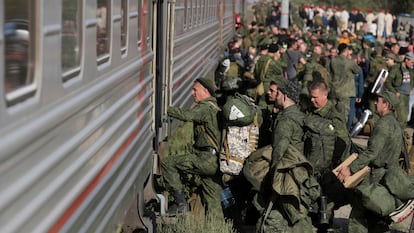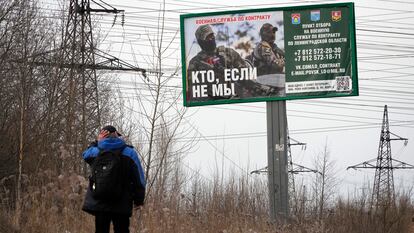The Kremlin makes it harder for Russians to dodge the draft
The lower house of parliament has approved a law hardening the conditions for conscription, even as the government denies it is planning another mass call-up


The State Duma, the Russian lower house of parliament, on Tuesday approved a series of measures to prevent citizens called up by the Army from avoiding the draft. The changes aim to prevent people from leaving the country once a digital notification reaches their account within Russia’s government services website, regardless of whether they open the message or not. “Not yet. And no,” Vladimir Putin’s spokesman, Dmitri Peskov, replied when asked if the authorities are considering a new call to arms in their war against Ukraine.
The hastily approved reforms, which still need approval from the upper house, raise fears that the Kremlin may be preparing a second mass conscription of citizens to send to the front. “This [the legal reform] has nothing to do with a conscription,” said Peskov on Tuesday. Eight days before the previous draft, on September 13 of last year, Peskov categorically denied that the Kremlin was going to take that step. Yet soon after that, Putin signed a decree that mobilized an undisclosed number of citizens. According to the Ministry of Defense, up to 300,000 citizens were called to the recruitment points, although several independent Russian media outlets reported that presidential sources raised the figure to around one million people.
The Duma has passed the new legal reform at full speed. The bill was introduced before noon and by 4 p.m. its three readings had already been approved by overwhelming unanimity: 394 votes in favor and one abstention. Nina Ostanina, a lawmaker for the Communist Party, said that many of her Duma colleagues did not have time to familiarize themselves with the legal text. “Approving a complete law after listening to some interviews on television and looking at the text for two hours sitting inside this room... Neither I nor my colleagues remember anything like this before,” lamented Ostanina as she addressed the Duma.
One of the few remaining opposition parties in Russia, Yabloko, has denounced the approval of this law. “None of the Duma deputies opposed it (five Putin parties in disguise!), and only one abstained,” one of Yabloko’s best-known politicians, Boris Vishnevsky, wrote on his personal Telegram channel.
“They are trampling on constitutional rights again in order to fill the army with new recruits,” he added, before warning that there will be a massive flight of talent and young people from Russia. “The authors of this law know exactly what they are doing: deliberately depriving the country of a future.”
Rumors about a new mobilization have not died down, even though the first one supposedly concluded at the end of October. The lack of progress on the front and the prospect of a long war have fueled this fear. In addition, the Kremlin never issued a decree officially ending that first conscription, saying that Putin’s word would suffice for this.

Electronic summons
The chairman of the Defense Committee of the State Duma, former commander Andrei Kartapolov, specified that the reform affects not only new recruits who must complete compulsory military service, but also reservists and everyone else with ties to the army. But he left out mobilized civilians because he said that the government is not considering another conscription.
The new legislation addresses summons at recruitment points, a loophole that allowed many Russians to dodge the draft last fall and flee the country. For this reason, one of the amendments will now equate certified mail with electronic notices sent through the popular government services website Gosuslugi. Unlike physical letters, the delivery of which is only validated if the recipient signs a receipt, an electronic summons will be considered received the instant it arrives in the recipient’s inbox, regardless of whether he opens it or not.
Likewise, a summoned citizen will not be able to dodge the draft even if he deletes his profile from Gosuslugi and does not open the door to any mailman. The new legislation states that summoned citizens will be included in a special registry after seven days have elapsed from the delivery of their notice.
One of the key points of the law is the prohibition to leave the country as soon as the summons is delivered. If the affected individual does not show up at his local recruitment point after 20 days, he will be subjected to further restrictions that include revoking his driver’s license and preventing him from taking out loans and registering companies or real estate.
Another important aspect of the reform is the creation of a single military registry that will contain all kinds of personal data about citizens who have served or should serve in the armed forces, including information about their place of work, their education, and their health condition. The Ministries of Health and Education are just some of the organizations that will provide this information.
Burning of recruitment centers
The conscription decreed by Putin on September 21, 2022 triggered the second mass flight of Russians following the start of the war. Hundreds of thousands of people left the country in the first two weeks after the call-up. According to Forbes magazine, some 700,000 Russians left the country between that day and the beginning of October, although this figure has been denied by the Kremlin.
Simultaneously, the call-up descended into chaos. The vagueness of the decree and Putin’s promise that only civilians with prior military experience would be recruited clashed with the forced conscription of thousands of ineligible Russians, especially in regions with ethnic minorities. Defense Minister Sergei Shoigu acknowledged months later that it could have been done much better.
Meanwhile, protests were quickly suppressed, although a wave of fires spread through the Russian enlistment points. On Tuesday of this week, a military court in Yekaterinburg, in the central part of the country, sentenced an employee of the Emergencies Ministry, Alexei Nureyev, and a National Guard driver, Roman Nasriyev, to 19 years in prison for setting fire to a recruitment center.
Both men broke a window of the center and threw a Molotov cocktail inside, which burned down an information stand. The case was reclassified as a terrorist act after initially being considered a misdemeanor. “I knew that actions like this were being carried out throughout the country. I knew that no one was hurt. With this I only wanted to show that in our city there is disagreement with the mobilization and the special military operation. I wanted my voice to be heard,” said Nasriyev at his trial, according to the human rights organization Zona Solidárnosti.
Sign up for our weekly newsletter to get more English-language news coverage from EL PAÍS USA Edition
Tu suscripción se está usando en otro dispositivo
¿Quieres añadir otro usuario a tu suscripción?
Si continúas leyendo en este dispositivo, no se podrá leer en el otro.
FlechaTu suscripción se está usando en otro dispositivo y solo puedes acceder a EL PAÍS desde un dispositivo a la vez.
Si quieres compartir tu cuenta, cambia tu suscripción a la modalidad Premium, así podrás añadir otro usuario. Cada uno accederá con su propia cuenta de email, lo que os permitirá personalizar vuestra experiencia en EL PAÍS.
¿Tienes una suscripción de empresa? Accede aquí para contratar más cuentas.
En el caso de no saber quién está usando tu cuenta, te recomendamos cambiar tu contraseña aquí.
Si decides continuar compartiendo tu cuenta, este mensaje se mostrará en tu dispositivo y en el de la otra persona que está usando tu cuenta de forma indefinida, afectando a tu experiencia de lectura. Puedes consultar aquí los términos y condiciones de la suscripción digital.








































